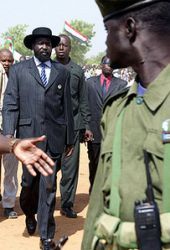Instability fades Sudan peace deal anniversary
Jan 9, 2006 (KHARTOUM) — Sudan marked the first anniversary of its landmark north-south peace agreement with low-key celebrations, as the country remained plagued by violence, starvation and political jostling.
 “Sudan and its national government renews its steadfast determination to implement all the articles of the peace agreement,” the foreign ministry said in a statement on the eve of the anniversary.
“Sudan and its national government renews its steadfast determination to implement all the articles of the peace agreement,” the foreign ministry said in a statement on the eve of the anniversary.
On January 9, 2005, Sudanese President Omar al-Beshir’s Islamist regime and the mainly Christian southern rebels signed the deal that put an end to a war that had lasted 21 years, killed 1.5 million people and displaced four million.
The main anniversary event took place in the southern capital Juba and was attended by Salva Kiir, whose Sudan People’s Liberation Movement (SPLM) joined Beshir’s National Congress Party in a unity government last year after years of bitter fighting.
But the mood was anything but jubilant in the south, where the population has accused the former northern regime of reneging on peace.
“Just as it was very difficult reaching the agreement, the process of implementation has not been an easy one as well,” the SPLM said in an anniversary statement.
“In comparison to what has been expected to be achieved in one year, very little has been accomplished,” it added.
Aid agencies also stressed that implementation of the peace deal was falling far behind and was not always making a difference for the civilian population
“The peace agreement signed a year ago was a momentous achievement,” said Sorcha O’Callaghan, spokesperson for a coalition of six international aid agencies operating in Sudan.
But “with conflict still raging in Darfur and insecurity in the south and east of the country, many Sudanese have little to celebrate,” O’Callaghan added.
In a positive development, the ceremony saw Paulino Matip, a dissident southern warlord, officially rallying to the SPLM and announcing the absorption of his South Sudan Defence Force militia.
Delegates from the Intergovernmental Agency on Development (IGAD), the east African group that sponsored the talks that led to the signing of the deal attended the event in Juba, along with UN and other regional officials.
Former Kenyan president Daniel Arap Moi, under whose auspices the early stages of the peace talks were held, was the event’s guest of honor.
All parties called on the international community to deliver on pledges it made at a donors’ conference in Norway last April for 4.5 billion dollars in development assistance for war-affected areas of Sudan.
The World Food Programme’s Simon Crittle said north-south peace had allowed major infrastructure projects to take off but stressed the world needed to speed up its payments if they are to be completed.
For example, the WFP has already built 800 kilometres (500 miles) of roads in the south, as part of a 200-million-dollar project.
The roads “have allowed a resumption of trade with neighbouring countries and the price of food as a result has started to drop,” he told AFP.
But the agency will still need upwards of 700 million dollars to feed an estimated six million people across the country this year, WFP’s biggest operation in the world, he added.
The repatriation of southerners in these conditions is a huge logistical challenge, compounded by the presence in the area of thousands of landmines which will take decades to be cleared.
After a first year plagued by ongoing conflict, the death of historical southern leader John Garang and bickering between the former foes over oil wealth and power, the peace deal will have to show its mettle in 2006, the aid agencies said in their statement.
“The challenge this year is to make sure that people of Sudan really feel the benefits of peace,” they said.
(AFP/ST)
